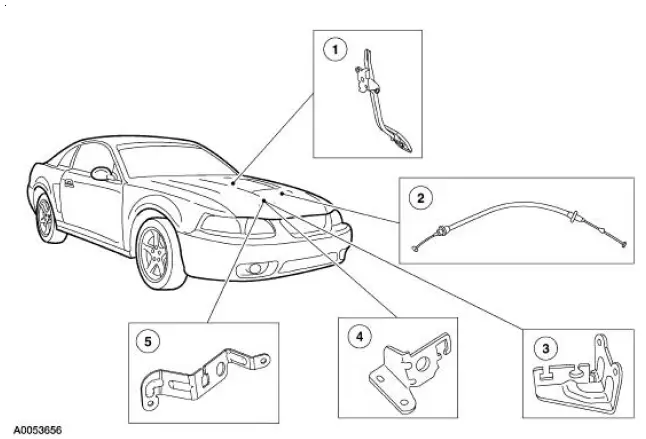Ford Mustang (1999-2004) Service Manual: Acceleration Control (Description and Operation)
Component Locations


The throttle is controlled by the accelerator cable which is connected to the accelerator pedal and shaft.
- The accelerator pedal and shaft should travel smoothly from the idle to the wide-open throttle (WOT) positions. Hesitation on return or prevention of return to the idle position must not occur.
- Surrounding components such as wiring, hoses, sound insulator and floor covering must not contact the sliding inner member of the accelerator cable or the accelerator pedal and shaft.
- The sliding inner member of the accelerator cable should not be lubricated and is not serviceable.
 Acceleration Control (Diagnosis and Testing)
Acceleration Control (Diagnosis and Testing)
Inspection and Verification
1. Verify the customer's concern by operating the acceleration control system
to duplicate the
condition.
2. Inspect to determine if any of the following mechanical conce ...
Other materials:
Acceleration Control (Diagnosis and Testing)
Inspection and Verification
1. Verify the customer's concern by operating the acceleration control system
to duplicate the
condition.
2. Inspect to determine if any of the following mechanical concerns apply:
Visual Inspection Chart
Mechanical
...
Inspection and Assembly Requirements - Following an
A/C
Compressor Failure
CAUTION: To prevent refrigerant system contamination and possible
failure of the new
A/C compressor, carry out the following procedures.
1. NOTE: A dirty A/C evaporator core orifice or a condenser to
evaporator tube containing black
refrigerant oil and parti ...
Door Window Glass Adjustment - Height Stop Adjustment
1. Close the front door.
2. Loosen the screws.
3. Raise the door window glass to the desired height.
4. Tighten the screws.
Door Window Glass Adjustment -Stabilizer
1. Raise the door window glass to the full up position.
2. Loosen the bolts.
3. ...

